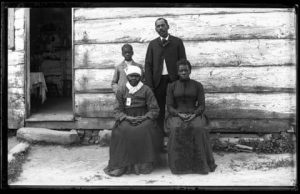Ann Joice
Her unswerving contention that she was a free woman wrongfully enslaved, later freed her enslaved descendants.

(1660-1735)
Ann Joice was born in the West Indies and taken to England before she was brought to Prince George’s County, Maryland as teenager and enslaved. Ann Joice was brought to Maryland by Charles Calvert, the 3rd Lord Baltimore, between 1676 and 1677. She was then enslaved by the family of Henry Darnall. Anne and her descendants were enslaved by several influential Maryland families like the Darnalls and Carrolls, as well as the Jesuit priests who operated White Marsh Plantation in Prince George’s County. She and her descendants were part of the Georgetown 272.
Throughout her life, Joice always adamantly maintained that she was actually an indentured servant, because she came to Maryland through England, which no longer had slavery. She vociferously related her story to family and friends throughout her lifetime. This narrative was the inspiration to her great, great grandson, Charles Mahoney, who was enslaved, to petition the Maryland court in 1791 for his right to freedom. He claimed that he was descended from a free woman.
A 1678, document surfaced showing that Ann Joice actually was an indentured servant. Her great, great grandson’s legal struggle to gain his freedom was important in the abolition movement. Ann Joice’s tenacity and vigorous objections to her imposed and incorrect social status were her legacy.
Submitted by: Maryland Women’s Heritage Center Ann Joice – Maryland Women’s Heritage Center (mdwomensheritagecenter.org)
Additional Resources
‘It stops you cold’: the 272 enslaved people sold to fund Georgetown | Maryland | The Guardian
O Say Can You See: Early Washington, D.C., Law & Family (earlywashingtondc.org) Joice, Darnell, Carroll
The Timing of Queen v. Hepburn: An exploration of African American Networks in the Early Republic.
